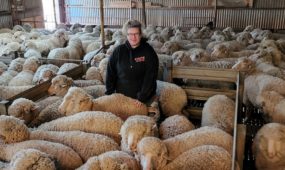Plant molecule crucial to improving stress tolerance in cereal crops
Primary Industries
TINY molecules found in plants are being targeted to breed cereals with the potential to deliver high crop

Sign up to receive notifications about new stories in this category.
Thank you for subscribing to story notifications.
yields under stressful growing conditions such as drought and heat
Researchers from the University of Adelaide found small gene-regulating RNA molecules already present in plants could be used to understand why certain strains of cereals fared better in adverse conditions.
Associate Professor Jason Able said by exploiting these RNA pathways, breeders around the globe would be able to more precisely engineer crops and develop varieties better equipped to handle adverse conditions.
“What we’re identifying is that particular small RNA molecule controls or could control simple, important targets through the life cycle of a plant,” he said.
“Through understanding the functional role of these molecules we may wish to regulate, we may overcome particular environmental challenges.
“We can now take that information forward and use those selection lines in making new potential varieties.”
Potential areas for development include the reproductive timing in plants, or alteration of root structures, in order to make crops less susceptible to environmental stress.
“You could manipulate or understand what molecules control flowering time traits and then bring forward the maturity of that plant for example, so that it avoids heat stress,” Associate Professor Able said.
Associate Professor Able is Head of Agricultural Science within the University of Adelaide’s School of Agriculture, Food and Wine and is senior author of the paper on SMARTER cereal breeding: Small RNA-Mediated Adaptation of Reproductive Targets in Epigenetic Regulation, which is published in the journal Trends in Plant Science this week.
He said using the same research, grain yields and quality could also be improved by altering the developmental stages of cereal crops.
While current study has looked at plant development suited to Australian growing conditions, Professor Able said the same research would also be useful in other climates.
“It could be applied worldwide, and there’ll be people around the world who will be working towards what we’re working towards.”
“Continual improvement through plant breeding underpins food security globally.
“With the world’s population set to reach more than nine billion by 2050, we need to intensify our efforts in breeding new cereals and other food plants with improvements in yield, quality and disease resistance.”
According to the United Nations Food and Agricultural Association, cereal crops make up more than 50 per cent of all food based energy, with more than 1091 million tonnes produced for food usage over the past year.
Drought stress impacts wheat yield in particular, with approximately 32 per cent of all wheat crops in developing countries experiencing drought stress during the growing season.
Because the RNA molecules identified by research are already present in all organisms, the findings can be applied without the need for genetic modification.
“These molecules are already out in the field as we speak, it’s just that we haven’t really been able to put a handle on them previously,” Associate Professor Able said.
“So it’s just a matter of the breeders getting hold of that information and starting to make those strategic breeding crops to develop that variety.”
South Australia’s capital Adelaide has three long-standing public universities, Flinders University, University of South Australia, and the University of Adelaide, each of which are consistently rated highly in the international higher education rankings.
Jump to next article



